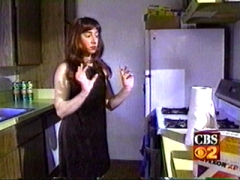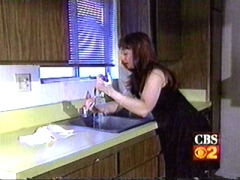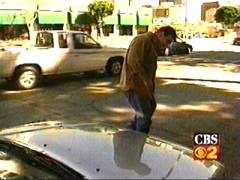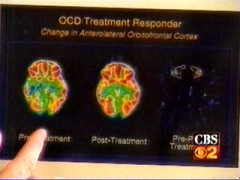 |
 |
 |
 |
| |
||||
Obsessive CompulsiveCBS 2 News Special Assignment  Imagine not being able to do the simplest things in life like driving a car or even mailing a letter without feeling a gripping anxiety. Imagine not being able to do the simplest things in life like driving a car or even mailing a letter without feeling a gripping anxiety. It would be almost impossible to cope but that's exactly what one in forty people with obsessive-compulsive disorder have to live with everyday. CBS 2 News' Thelma Guiterrez gives us a glimpse into their daily struggle. Special Assignment: Obsessive Compulsive aired Friday, June 26, 1998 at 11 p.m. The patients asked that the I-Team not use their real names. One person even asked that the I-Team not show her face. Each of them were worried that people who wouldn't understand their illness would think that they are crazy, reported CBS 2 News' Thelma Gutierrez. "It's the most horrible, devastating loss of control," OCD patient "Sharon" told Gutierrez. "(It's) a free-fall spinning that you could ever experience, and I deal with that type of a panic every single day." According to Gutierrez, OCD is actually a disease of the brain. It happens when one particular circuit in the brain is hyperactive. The circuit will lock onto one specific thought or obsession that triggers rituals that seem bizarre even to those that suffer from OCD. "I was checking, perhaps a lamp 6 to 12 times, running back and forth, getting really panicky," said Sharon. For Sharon, the obsession gradually got worse. Sharon had shoes for all occasions. That may not sound unusual, but actually they were particular pairs of shoes to walk in when she was in the first floor of her home. There was also specific pairs to walk in when she was on the second floor and other pairs for different areas of our home. "I was becoming more and more afraid of people and other items contaminating me," Sharon said. A basic routine of washing hands was pure torture for Sharon. She showed Guiterrez how difficult such a simple act could be for her. Sharon walked into the kitchen with her arms up. She then used a paper towel to turn on the kitchen sink in an effort to avoid contact with the faucet knobs. With a bar of soap in her hands, Sharon began washing her hands. "One, two, three, four, five, six, break, scrub, scrub," said Sharon. "Go under the water and out, under the water and out, under the water and out." Shaking off the excess water from her hands was also laborious. "One, two, three, four, five, six. One, one, two." Before she began suffering from OCD, Sharon was a doctor. She made a good living at it until the disorder hit her in 1993. "I lost everything, I lost my career, I lost my income, I lost my future income, I lost my financial security," said Sharon. Sal realized something was wrong when his 10-minute drive from work to home was taking 8 hours. It took him that long because every bump in the road was triggering an obsessive-compulsive thought, said Gutierrez. Everytime Sal hit a bump, he would stop and get out of the car. He would then check the front, back and underneath his car for what he believed were dead bodies. "I mean I was at a point where I was going to call all the police departments and set up a thing online where you could go and check to see if there were any hit-and-runs," Sal told Gutierrez. Sal, however, decided to seek help instead. Dr. Sanjaya Saxena and Arthur Brody at the UCLA's OCD research program are trying to find ways to help OCD patients like Sal to cope. Using a scanner that takes pictures of the brain, researchers study the changes in brain metabolism. "What our study does is show how treatments work," Saxena told Gutierrez. "It helps us to understand precisely where the medications are working in the brain and how it is that this medication produced changes in a wide array of different symptoms." At UCLA, Sal must undergo six weeks of intensive behavioral therapy. Sharon has overcome her OCD rituals after drug and behavioral therapy and like Sharon, Sal too hopes to be able to overcome his disorder. "Like the doctor says, it most likely will come back but I've just got to keep fighting it and fighting it," said Sal. RealVideo:
|
|
 |
|

 |
||
|
12 p.m.
Woman 2 Woman One of the stars from "Judging Amy" 5 p.m. 6 p.m. 11 p.m.
|
||
 |
||
|
4-5 p.m.
Judge Judy Ruler Of The Free World! 8:00 p.m. 8:30 p.m.
9:00 p.m.
|
||
| |
||
 CBS 2 News' I-Team interviewed three people who suffer from obsessive-compulsive disorder, also known as OCD.
CBS 2 News' I-Team interviewed three people who suffer from obsessive-compulsive disorder, also known as OCD.  And so began and exhausting ritual of decontamination.
And so began and exhausting ritual of decontamination.  For another OCD patient named "Sal," driving down the street was difficult, Gutierrez said.
For another OCD patient named "Sal," driving down the street was difficult, Gutierrez said.  Drug therapy like Prozac and Luvox are commonly used, but new drugs are currently being tested on people with OCD.
Drug therapy like Prozac and Luvox are commonly used, but new drugs are currently being tested on people with OCD. 

